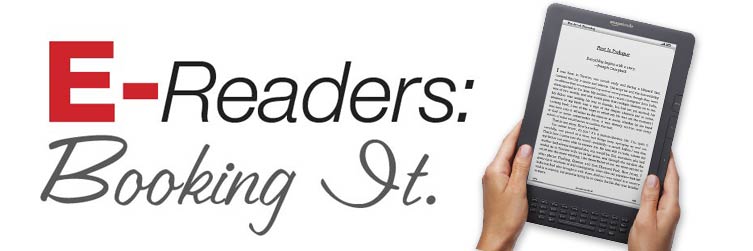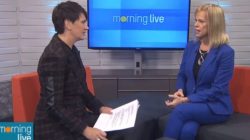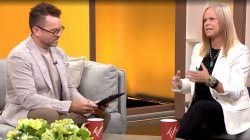“What’s the name of the book you’re reading?” As I looked up from my BlackBerry Playbook, where, thanks to my Kobo app, I was engrossed in an excellent read*, I paused for a minute and said “I’m not sure, actually, but it’s really good.”
I realized I wasn’t sure what the author’s name was, either. Welcome to the new world of e-reading and the “coverless” book.
While I love being able to download a book at a moment’s notice on my Playbook (or my Kobo, or my Kindle), this question made me realize that without looking at the cover and the author’s name and book title each and every time I picked it up, I was losing that physical connection.
As a book author myself I found this a little disturbing, yet I know intellectually that the e-book has many other benefits. So whether you’re thinking about investing in, or gifting an e-reader with the upcoming holiday season, what do you need to know about them, and are they going to replace the “real” book?
I spoke with Marc Saltzman, a syndicated tech expert, about what he liked and didn’t like about the current crop of e-book reader vehicles, which include the single application technologies of the Kindle, the Kobo and the Sony E-Reader, as well as the app-based software on the iPad, Playbook, and an assortment of other tablets.
An avid reader and traveler, Saltzman’s personally preferred way to read a book is on his iPad2.
“The main advantage of any e-reader is that you can carry thousands of books with you on a device that is thinner than most magazines”, says Saltzman.
Hilary McMahon, Vice President and Literary Agent (representing authors) at Westwood Creative Artists,
agrees that there are many benefits to e-books. “E-books have transformed the way we buy books. If a buyer’s interest is piqued by a recommendation they receive at a dinner party at 10 p.m., she can have that book available at 10:01 without ever leaving the table.”
In a society obsessed with instant gratification, this is a huge benefit. And there’s more, says Saltzman: “I can adjust the font size, shop 24/7, and for the most part, they’re wireless so there’s no tethering, etc. I can double-tap on a word and get an instant dictionary definition, and the books are always priced lower than a hardcover, and sometimes less than a paperback.”
Saltzman also likes the fact that with no trucks transporting books, or paper production, etc., it’s friendlier to the environment to read on an e-reader.
Of course, e-readers aren’t the perfect reading mechanism, all the time.
“There’s no substitute for the tactile pleasure of curling up with a book.” says McMahon. Saltzman agrees on the physical pleasure of a traditional book. “It’s a less intimate gift to give someone an e-book, versus an inscribed real book,” he says. “Also, these are “battery operated” books, so if you run out of power, you can’t read.”
And while the cost per book is less on an e-reader, there is the upfront investment. “The hardware is more costly to buy in the first place, and then you don’t want to take it to the beach and risk it. A curled up paperback is definitely better there.” Also, reading in the beach sun’s glare can be hard on a tablet based e-reader, although most dedicated e-readers have an anti-glare screen.
Not all books have been easily translated from print to digital, and there are downsides to certain types of books as well. McMahon surmises that “though there have been tremendous advancements in children’s publishing (picture books were late adapters) most parents are already concerned about screen time and are still choosing the traditional formats.”
Cookbooks have been one of the last genres to enter the e-book space, due mostly to the fact that we don’t want to drip gravy on our electronic devices. But with Alfred A Knopf recently releasing the e-book edition of the ultimate cookbook, Julia Child’s Mastering the Art of French Cooking, it’s being seen by many to signal the publishing industry’s total embracement of this technology.
Transferring books already created and produced in print format over to digital format is not easy and cookbooks (including Child’s, with its double column format) have been a real obstacle. But increasingly these barriers are quickly being taken away as well.
But what has it done to the financial side of things for publishers, and authors?
“The challenge is that consumers are very price-conscious, and they’re looking for better and better deals. They’re not willing to pay as high a price for an e-book, and that’s wreaking havoc for the creators themselves and the publishers who act as gatekeepers. The volume of books sold has increased significantly, but that can’t begin to compensate for the way that sales of physical books have plummeted.” says McMahon.
All authors have a digital book clause in their contracts today, and many older contracts had to be amended to include this new technology. Typically, the percentage amount of commission paid to a writer increases with the sale of an e-book, but this is more than offset by the lower sale price.
What does the target market for e-readers look like? “It’s been surprising to some that high volumes of sales have come from a more mature readership who aren’t traditionally as technology savvy. But they have the income to afford the devices and the leisure time to indulge in more time reading.” concludes McMahon.
“For many consumers, e-readers are invaluable for travel (much easier to load ten books onto a device than weigh down the suitcase) and to conceal the content being read – romances are very hot sellers in digital format!” Saltzman carries his iPad2 everywhere, and reads books through iBooks. His favourite e-reader is the Kindle, preferring the keyboard for online searching, but he does like the Kobo feature of having a book read back to you, audibly, for those tired nights, or on a flight when he can plug his earphones in and relax.
The market for e-readers is growing and Saltzman predicts it will still be a hot gift this holiday season, but ultimately sees it as a supplement to the hardcover or paperback, not a replacement. “There’s a time and a place for each one.”
He compares the growth of the e-reader market and the concerns about its impact to when home theatres and large screen television sets came out and the death of the movie theatre industry was predicted. “Movie lovers will do both.”
True book lovers will likely find a place in their lives for both formats.
McMahon agrees with Saltzman on the rumours of the death of the traditional paper book are being exaggerated. “The reading experience has been revolutionized, but it’s certainly not dead yet…” she states.
The book I was reading was Tatiana de Rosnay’s “A Secret Kept,” 2009, St Martins Griffin, publisher. GL
This article first appeared in The Good Life and can be found at this link: http://www.goodlifemississauga.com/111-gl-2011/e-readers.html







